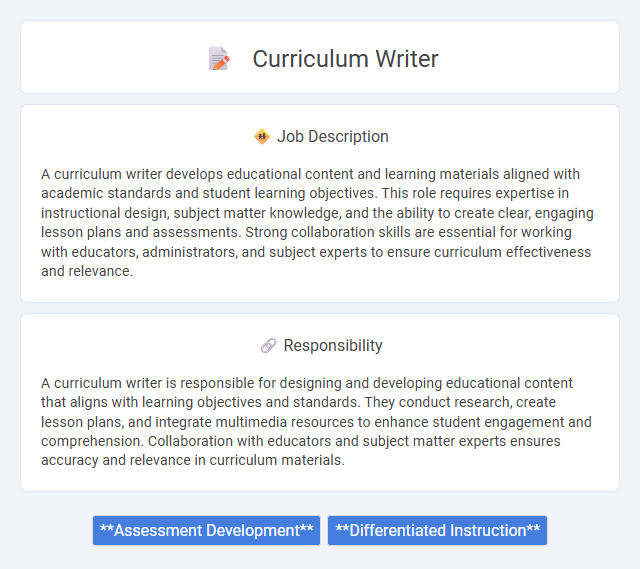
A curriculum writer develops educational content and learning materials aligned with academic standards and student learning objectives. This role requires expertise in instructional design, subject matter knowledge, and the ability to create clear, engaging lesson plans and assessments. Strong collaboration skills are essential for working with educators, administrators, and subject experts to ensure curriculum effectiveness and relevance.
Individuals with strong research skills and a passion for education are likely suitable for a curriculum writer position. Those who enjoy creating structured content, have attention to detail, and possess effective communication abilities may find this role fitting. People who prefer collaborative environments and can adapt to evolving educational standards probably thrive in this job.
Qualification
Curriculum writers must possess a strong background in education, typically holding a bachelor's or master's degree in curriculum and instruction, education, or a related field. Expertise in subject matter, instructional design principles, and assessment strategies is essential for developing effective educational materials. Proficiency in educational technology and knowledge of learning standards ensure curriculum alignment and engagement across diverse learner populations.
Responsibility
A curriculum writer is responsible for designing and developing educational content that aligns with learning objectives and standards. They conduct research, create lesson plans, and integrate multimedia resources to enhance student engagement and comprehension. Collaboration with educators and subject matter experts ensures accuracy and relevance in curriculum materials.
Benefit
Hiring a curriculum writer could significantly enhance the quality and coherence of educational materials, increasing the probability of improved student engagement and learning outcomes. Their expertise in aligning content with educational standards may lead to more effective and comprehensive lesson plans. Investing in a skilled curriculum writer might result in time savings for educators, enabling them to focus more on instruction and student support.
Challenge
Curriculum writer jobs likely involve the challenge of balancing educational standards with engaging content that meets diverse learner needs. They may face difficulties in aligning curriculum objectives with assessment methods while incorporating evolving pedagogical trends. Adapting to rapidly changing educational technologies could also pose ongoing obstacles in crafting effective learning materials.
Career Advancement
Curriculum writers play a crucial role in designing educational content that meets academic standards and learning objectives. Expertise in curriculum development and instructional design can lead to career advancement opportunities such as senior curriculum developer, instructional coordinator, or education consultant. Proficiency in educational technology and data-driven assessment strategies enhances promotion potential within academic institutions and corporate training environments.
Key Terms
Assessment Development
Assessment development in curriculum writing involves designing valid and reliable evaluation tools that measure student learning outcomes effectively. Curriculum writers collaborate with subject matter experts to create formative and summative assessments aligned with educational standards and learning objectives. These assessments include diverse formats such as multiple-choice, performance tasks, and rubrics, ensuring accurate measurement of knowledge, skills, and competencies.
Differentiated Instruction
A curriculum writer specializing in Differentiated Instruction designs adaptable educational materials that cater to varied learning styles, abilities, and interests, ensuring inclusivity and accessibility in classrooms. Their expertise in crafting tiered lessons, flexible assessments, and personalized learning paths enhances student engagement and academic achievement. Mastery of educational standards and best practices in differentiation tools is essential for developing effective curricula that support diverse learner needs.
 kuljobs.com
kuljobs.com